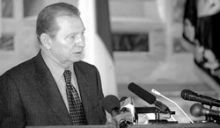On November 17, President Kuchma made a number of high- profile statements on the vital issues of Ukraine’s domestic and foreign policy, addressing a conference called Ukraine On the Threshold of the Twenty-Fist Century held at the Institute of International Relations. According to the President, it is time the relationships of Ukraine with the EU changed: “We have to learn to think the European way, and not only when we go to Brussels.” Ukraine’s top priority today is to build a viable economy, Interfax- Ukrayina quotes the Ukrainian President as saying. Apart from Europe, Ukraine’s foreign policy should also be tailored to develop good relations with Russia as well as the countries of Asia, Africa, and Latin America where there are free markets on which Ukrainian goods can be sold. Should George Bush Jr. win the presidency, the United States might revise its policy toward Ukraine, Kuchma believes, for Bush is likely to focus more on domestic policy. Kuchma admitted that Ukraine’s relations with the IMF cannot be passed over in silence; strategic differences remain, but both sides should sit at the table and try to understand each other.
President Kuchma was skeptical speaking about the prospects for the CIS: “With the number of various unions within the CIS, could there be really any talk about its prospects?”
The President is convinced that Ukraine has no future, if the results of the national referendum are not implemented. He supported the proportional system for the elections to the bicameral legislature. If Verkhovna Rada takes its time in enacting the election law, Kuchma said he will favor the mixed system.
“A stop must be put to the hounding ofdown Prime Minister Yushchenko by his opponents, including those in the Cabinet,” Kuchma warned. He recalled that the Premier had shaped his team himself. “Honestly, there are persons on his team whom I would fire were I in charge,” Kuchma said, stressing that, “I don’t understand why the Prime Minister should protect such people.” Kuchma described as nonsense all the talk about the possibility of creating a pro-government majority in Verkhovna Rada.
In his address to the conference Kuchma focused on bringing Ukraine’s shadow economy to heel and curtailing the impact of oligarchic structures on the state; fighting the merger of oligarchic clans with state bureaucrats, rethinking the role of the state alongside increasing the efficiency of government; reforming relations with the IMF and other international financial organizations to find a mutually acceptable patterns for cooperation as well as stepping up reforms in the administrative, judicial, and banking sectors. These key moments of the President’s address could well be the answer to the question about Ukraine’s strategies for the twenty-first century. This strategy should necessarily entail accelerated development which can give Ukraine the chance to find its fitting place in the world community.
President Kuchma’s strategic declarations were coupled with the admission of shortcomings at the initial stage of Ukraine’s transformation. It was for the first time that he acknowledged his own mistakes, hopefully an indication that a global rethinking of the role and goals of the government is underway, with new systems for strategic planning and priority-setting emerging. After nine years of independence, the President said, Ukraine has finally emerged as a full-fledged entity. This marks the end of the initial period in the nation’s transformation. He stressed that the goals and aims in the new stage in Ukraine’s development are by far more complex and demanding than in the previous one. For Ukraine, the transition to a market economy has been a much more difficult process than in neighboring countries, due to the longer period of totalitarian rule in Ukraine. Economic and social reforms have brought about significant losses, such as a 50% drop in the economy, lower living standards, serious demographic problems, deformation of production structure and property relations. “It has been more difficult to maintain the sovereignty of Ukraine than it seemed at the outset,” Kuchma reiterated, which was due to the effect of several factors, including the Russian one, with Ukraine faced with “rigid official and even more rigid unofficial opposition to its bid to attain economic independence.” Unfortunately, this factor is still present. All the hopes that we pinned on foreign aid did not materialize, and Ukraine has had to deal with its problems on its own .
Our losses have also been caused by the lack of any comprehensive and steady transformation in the Ukrainian society, mistakes in the strategies of reform, and spontaneous reforms without the necessary theoretical grounding, which have led to our disintegration and economic downfall. The efforts to step up reforms made in 1994 failed due to the economic slump and the standoff among the branches of power. The major shortcoming of the then transformation model was that it was based on one-sided economic theory, or more precisely, on the theory of market fundamentalism. With a considerable segment of Ukraine’s economy operating in the gray sector, the budget does not receive UAH 10-12 billion in unpaid taxes annually. As many officials are involved in the gray sector, the state cannot implement its mission because state policy is increasingly becoming shaped “by individuals or groups of individuals whose actions are based on corporate interests and goals’ and who exert influence on the legislature, law enforcement, courts, executive officials and mass media.
But in spite of everything, the President urged his listeners to discard reductive assessments of the representatives of Ukraine’s financial/industrial capital, saying it should not be confused with oligarchs.
The state can relinquish its control over society only if effective market mechanisms are first set up, President Kuchma believes. “This rule of thumb has been abandoned in Ukraine,” he admitted. The state power’s low efficiency is a major obstacle to reaching economic and social policy goals, while world experience proves that the role of the state should increase during transformation periods.







